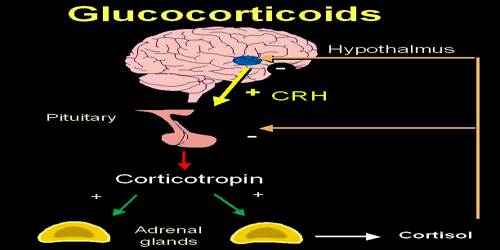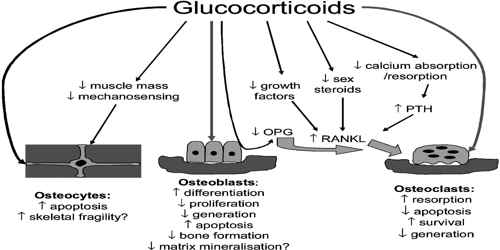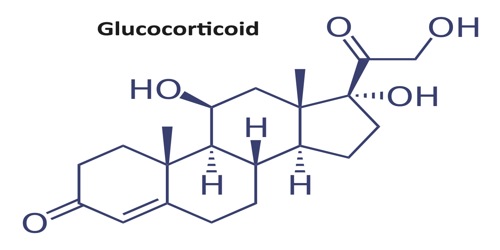Glucocorticoid
Definition
Glucocorticoid is any of a group of anti-inflammatory steroidlike compounds, such as hydrocortisone, that are produced by the adrenal cortex, are involved in carbohydrate, protein, and fat metabolism, and are used as anti-inflammatory agents. Glucocorticoids (GCs) are steroidal hormones or corticosteroids. Cortisone and cortisol are produced naturally by the body, but in small quantities; the hormones are thus secreted to compensate for adrenal deficiencies. Synthesized glucocorticoids reinforce this action.

The adrenal gland is an organ situated on top of the kidney. It consists of an outer cortex (adrenal cortex) and an inner medulla (adrenal medulla). The hormones secreted from the cortex are steroids, generally classified as glucocorticoids (e.g., cortisol) and mineralocorticoids (e.g., aldosterone, which causes sodium retention and potassium excretion by the kidney). Those substances emanating from the medulla are amines, such as epinephrine and norepinephrine.
Glucocorticoids are distinguished from mineralocorticoids and sex steroids by their specific receptors, target cells, and effects. In technical terms, “corticosteroid” refers to both glucocorticoids and mineralocorticoids as both are a mimic of hormones produced by the adrenal cortex, but is often used as a synonym for “glucocorticoid.” Glucocorticoids are chiefly produced in the zona fasciculata of the adrenal cortex, whereas mineralocorticoids are synthesized in the zona glomerulosa.
Effects and Uses of Glucocorticod
Glucocorticoids have so many functions, man-made or synthetic glucocorticoids have been developed to help treat many different conditions. It may sound like miracle drugs, but they do have side effects. Some of these side effects can be very damaging. This is why these drugs aren’t prescribed for long-term use.
These drugs can:
- increase our blood sugar level, which can trigger temporary and possibly long-term diabetes
- suppress our body’s ability to absorb calcium, which can lead to osteoporosis
- increase our cholesterol and triglyceride levels
- increase our risk of ulcers and gastritis
- delay wound healing, which requires a certain amount of inflammation
- suppress our immune system and make us more prone to infections

Long-term use of glucocorticoids can cause a loss of muscle tissue. It can also result in Cushing’s syndrome, which can lead to:
- a fatty hump between your shoulders
- round face
- weight gain
- pink stretch marks
- weakened bones
- diabetes
- high blood pressure
- thin skin
- slow healing
- acne
- irregular menstrual cycles
- decreased libido
- fatigue
- depression
Glucocorticoids together with mineralocorticoids are used in replacement therapy in acute or chronic adrenal insufficiency (Addison disease). Glucocorticoids, including a range of synthetic analogs, are also used as anti-inflammatory and immunosuppressant agents. As anti-inflammatory agents, they are used in the treatment of bronchial asthma. Glucocorticoids indirectly inhibit the activity of phospholipase A2, an enzyme that plays an essential role in the synthesis of prostaglandins and leukotrienes; its inhibition by lipocortin-1 underlies part of the anti-inflammatory effects of glucocorticoids. Glucocorticoids also reduce the synthesis of some proteins that directly mediate the inflammatory response.
Glucocorticoids could be used in the treatment of decompensated heart failure to potentiate renal responsiveness to diuretics, especially in heart failure patients with refractory diuretic resistance with large doses of loop diuretics.
Reference:
















